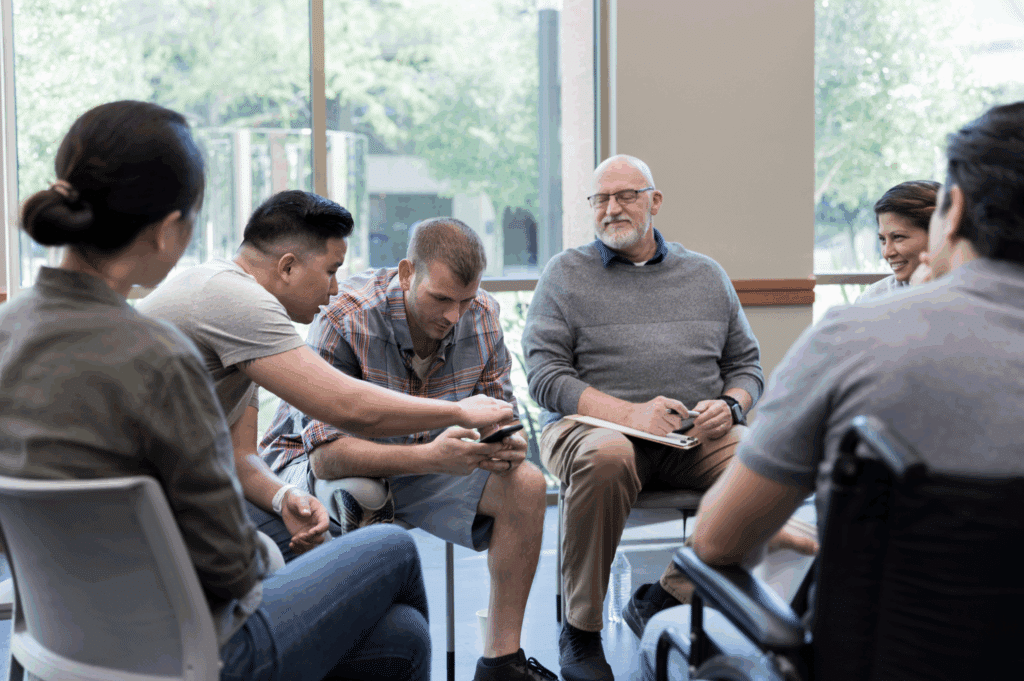With September’s National Recovery Month just around the corner, communities across Louisiana are getting ready to celebrate recovery successes and shine a light on the millions of people who are living proof that treatment works.
Recovery doesn’t happen in isolation. It flourishes when communities understand substance use and addiction, when a parent or cousin knows how to support their loved ones, and when individuals feel safe enough to raise a hand and say, “I need help.” Every conversation about recovery, every shared story, and every misconception corrected builds momentum toward a future where treatment is accessible and stigma doesn’t prevent someone from seeking it.
At New Day Recovery, we’ve seen firsthand how awareness transforms lives. When people start to understand that addiction is a treatable medical condition (and not some kind of “moral failing”), doors open for healing that used to be slammed shut by shame or misinformation. As we approach National Recovery Month this September, let’s talk about why awareness matters and how you can become part of this vital movement.
The Power of Personal Awareness in Recovery
Lasting recovery starts in the mirror (figuratively speaking). But understanding your own triggers, recognizing the signs of relapse and acknowledging the need for help is harder than it sounds, and that kind of awareness doesn’t appear overnight. It comes from education, self-reflection and hearing real stories from others who’ve been down the same road.
Personal awareness supports recovery by:
- Catching the warning signs of relapse before they snowball
- Understanding how addiction changes the brain and decision-making
- Knowing that relapse doesn’t mean failure (it’s a signal for more support)
- Seeing the personal strengths that make long-term recovery possible
- Acknowledging that co-occurring mental health conditions also need attention
With personal awareness comes accountability, self-compassion and the power to make decisions that take you closer to the life you want (and deserve) for yourself.
Awareness matters for family and friends, too. Loved ones can be a lifeline when they understand addiction as a chronic disease that needs ongoing maintenance and care, and that knowledge equips them to offer the kind of support that makes a real difference.
How Community Awareness Drives Change
Personal awareness and accepting the need for help jumpstarts the recovery journey, but community awareness creates an environment where that journey can succeed. In towns and cities across Louisiana, those that understand addiction and the recovery process are more likely to support treatment facilities, welcome sober living homes and give people second chances at work.
What does community awareness look like? It might manifest as employers who get that recovery is an ongoing process and offer more flexibility for treatment appointments, or as healthcare providers who provide more compassionate, effective care. Law enforcement trained in crisis intervention can also connect people to treatment rather than just making arrests.
Signs of Recovery-Aware Communities
Supportive communities share certain traits. You’ll see it in:
- Local businesses displaying recovery-friendly messaging
- Schools implementing prevention programs based on current research (not outdated scare tactics)
- Faith communities offering support without judgment
- Healthcare systems integrating addiction treatment with primary care
- Sober-friendly community events
- Public officials speaking openly about recovery as a shared priority
These changes don’t happen by accident. They come from the efforts of recovery advocates, treatment providers and individuals willing to tell their stories.
Breaking Down Stigma Through Education
Let’s be honest: stigma remains one of the biggest barriers preventing people from seeking addiction treatment. Too many Louisiana residents still view substance use through an outdated lens: moral weakness, lack of willpower, etc. These perspectives ignore decades of research demonstrating addiction’s impact on brain chemistry and behavior.
Fortunately, education is stigma’s most powerful antidote.
Studies show that negative attitudes toward people with addiction lead to less support for recovery services. When the public is skeptical about treatment effectiveness, they’re more likely to oppose policies aimed at helping people with drug or alcohol addiction. But with more people framing addiction as a medical condition, these attitudes can change.
When people learn that addiction involves measurable changes in brain structure and function, something shifts. They begin to understand why willpower alone rarely achieves lasting recovery. This knowledge transforms how communities respond to addiction, moving from punishment and shame toward treatment and support.
Common Misconceptions That Education Addresses
Several myths about addiction and recovery still persist. Let’s clear these up:
- Myth: People have to hit “rock bottom” before they can recover.
- Reality: Early intervention leads to better outcomes. Less damage to relationships, careers and health.
- Myth: Medication-assisted treatment (MAT) just replaces one addiction with another.
- Reality: FDA-approved medications for addiction treatment help normalize brain chemistry. They also significantly reduce overdose risk.
- Myth: Relapse means treatment failed.
- Reality: Like diabetes or hypertension, substance use disorders often require adjustments to treatment approaches over time.
- Myth: People with addiction choose their condition.
- Reality: Initial substance use involves choice, yes. But addiction? That involves brain changes that impair decision-making.
September National Recovery Month: A Movement Growing Stronger
Every September since 1989, National Recovery Month has united millions of Americans, celebrating recovery and spreading awareness about substance abuse treatment. What started as a small campaign has grown into a nationwide movement reaching communities large and small, including those right here in Louisiana.
This year’s observance has special significance: communities continue to address the ongoing impact of the opioid crisis while celebrating improvements in treatment accessibility. National Recovery Month will highlight the evidence-based treatments that have made a difference, the importance of peer support, and the fact that people do recover. With the right help, many people facing addiction go on to lead meaningful, fulfilling lives — they become teachers, nurses, parents, business owners. They become whole again.
The Substance Abuse and Mental Health Services Administration (SAMHSA) coordinates National Recovery Month activities. They provide resources for communities to host local events, with a free toolkit that includes materials for organizing recovery walks, hosting educational forums and sharing recovery stories through traditional and social media.
Getting Involved in Louisiana Recovery Events
All through September, Louisiana’s recovery community comes alive. You’ll find an annual 5k Recovery Race right here in West Monroe. Recovery movie screenings in Ruston. Awareness events hosted by NEDHSA. Other ways you can get involved might include:
- Attend a recovery walk or rally: These public events demonstrate community support. Plus, they celebrate those in recovery.
- Share educational content on social media: Raise awareness about substance abuse and treatment by spreading accurate information online.
- Volunteer with local recovery organizations: Many groups need help. Event organization, support services, you name it.
- Display purple ribbons or lights: Purple symbolizes recovery. Visible displays show community solidarity.
- Host a sober social event: Fun and fellowship don’t have to revolve around drinking (or drug use). Show people that.
- Advocate for recovery-friendly policies: Contact local officials. Ask them to support treatment and recovery services.
Even small gestures matter. Wearing a recovery pin, sharing an article, or having an open conversation about addiction all help chip away at stigma and build positive awareness.
Creating Lasting Change Beyond September
National Recovery Month provides focused attention throughout September, and that’s great, but lasting change comes from consistent efforts. As the flyers come down and the social media posts stop showing up on your feed, consider keeping the momentum going in your own way.
Maybe you pledge to learn more about addiction and support a friend in recovery. Or maybe you advocate for better access to substance use treatment in your local community. Whatever you choose, remember that your actions matter. Recovery happens one person at a time, but awareness spreads faster when we all do our part.
Join the Recovery Movement with New Day Recovery
At New Day Recovery, we witness the power of recovery daily. We see it through the courage of our clients, the dedication of their families, and the transformation that happens when people get the help they need. As September National Recovery Month approaches, we invite you to join us in spreading awareness and celebrating the reality that recovery is possible.
If you or someone you love struggles with addiction, don’t wait for September to seek help. Our comprehensive treatment programs in West Monroe and Shreveport, LA, provide evidence-based care that addresses both addiction and co-occurring mental health conditions. Contact us today at 318-900-7133 to learn how we can support your recovery journey.



